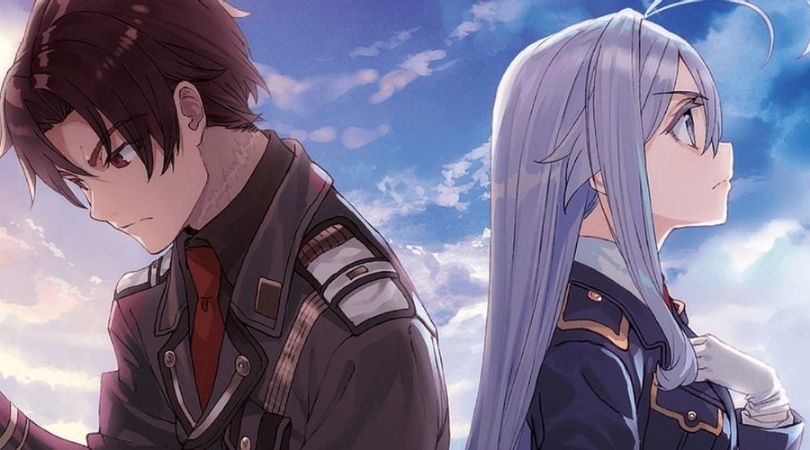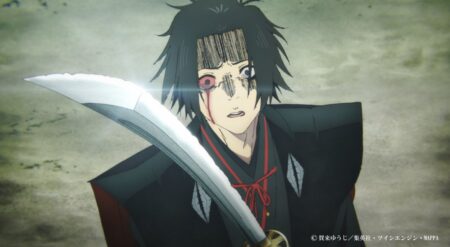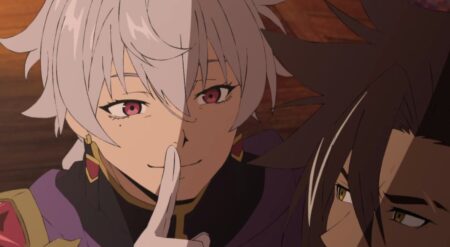
From the audio to the animation, A-1 Pictures adaptation of the EIGHTY-SIX light novel series knocks it out of the park, with a few caveats. EIGHTY-SIX (Stylized as 86 EIGHTY-SIX) is the story of two ends in a fictional war. In The Republic of San Magnolia, a war is being raged against machine drones known as The Legion. The Republic boasts that, through their own autonomous drones, they can fight a battle with no casualties. However, this is all a lie, and the Republic’s crimes run deep. The original Japanese light novel series from Asato Asato is available in English from Yen Press. EIGHTY-SIX Season 1 of the anime adapts the first novel in the series and includes a special recap episode.
EIGHTY-SIX Season 1 centers on Lena, recently promoted to Major in the Republic, and her new post as Handler of the Spearhead Squadron. In the war against the Legion, the “Eighty-Six” are the people who were sent outside the Republic’s 85 districts to fight. In order to boast that it is a “war with no casualties,” the Republic keeps the existence of the Eighty-Six a secret and considers them less than human in order to justify their war crimes. Lena, an idealist, tries to show empathy to her squadrons from her control room, but her world gets turned upside down when she is assigned to the Spearhead Squadron, the elite group of Eighty-Six on the front lines. Here she meets the Shin, referred to by the code name Undertaker, and the story is about the relationship they all form as the Spearhead Squadron seeks freedom and Lena is forced to confront her idealism and privilege.
Let’s get the elephant in the room out of the way: EIGHTY-SIX is a story that deals with fantasy racism. The Alba, a race of silver-eyed and silver-haired people, committed ethnic cleansing against anyone who wasn’t Alba, sending them to internment camps in the 86th sector. All of the messiness and cringe that can often come with fantasy racism can be found here. I, as a white reviewer, don’t believe it is my lane to judge whether something is done “well” in terms of writing fantasy racism. What I will do is point out what could be considered red flags for those interested in viewing. Aside from the above, EIGHTY-SIX Season 1 does hit the pitfall that all of the fantasy races are still mostly light-skinned. With the exception of one or two characters, different races are signified by hair and eye color. The writing isn’t subtle with its anti-war and anti-fascist dialogue: the Alba are often referred to as “white pigs” by characters. Additionally, while it only happens once or twice in the anime, the use of “colored” as a slur towards the Eighty-Six comes up, and honestly, ANY other option would have probably been better.
The anime certainly has these stumbles, and it impossible to give it a flawless score because of them, regardless of well intentions. Since a large portion of the story is told from Lena’s perspective, it can feel a bit white savior-y. However, the dialogue does a decent job of calling Lena out on her privilege. The show makes a point of showing that all her good intentions will not change the fact that she is sitting safe inside the walls and those she speaks to over the receiver are not. Lena has a solid arc in learning how to use her privilege in the system, while still showing that she participates in the system and has an unconscious bias because of it. This is especially the case when Lena confronts her uncle and her best friend, who she continuously had denied contributed to this horrific system.
Looking at the series as a whole, EIGHTY-SIX Season 1 stays very true to the original light novel in its condemnation of war. While the action is phenomenally animated, it isn’t as frequent as viewers might expect. Significantly more time is spent developing interpersonal relationships. While the series is brutal, it isn’t overly gory to the point of traumaporn. Even the characters that viewers may barely spend time with are given a visual memorial by the anime. Huge nod to Toshimasa Ishii‘s (The Promised Neverland) directing work on the show. The use of sound (or absolute silence), symbolic imagery, and flashback cuts all ensure that a character’s death carries weight instead of shock value.
It is in the little details like these that EIGHTY-SIX shines: The representation of time passing through a morbid mural, where the mannequin’s severed head slowly falls further and further off the body as the months pass; absolute silence, and dialogue that viewers will never hear, kept between characters in their last moments; and following the life of the Spearhead Squadron through their robot companion, Fido. Hiroyuki Sawano (Promare; RE:Creators; Attack on Titan) once again knocks it out of the park with a phenomenal score for the show. His music is so well done and adds a layer to the show that brings Asato’s world to vibrant life even amidst the darkness.
EIGHTY-SIX also excels in the details because it reminds viewers that these are children. The Spearhead Squadron is made up of teenagers, forced to fight because the internment camps ran out of adults. Many of these children never saw the inside of a school (there is a tear-inducing moment where Kurena is “given” that experience by the team). It doesn’t thrive in trauma and depression. It never forgets, but it also has moments of grace and lets the kids be kids. That is their rebellion. Their entire identity is on the battlefield, and the best way they can reclaim what life they have is through their joy. The show makes a point of reminding viewers of this.
Visually, EIGHTY-SIX Season 1 is an absolute win for anime fans. Sawano’s score and Ishii’s directing create a show that won’t let audiences look away from beginning to end. It is painful, but it is also thoughtful in its depictions of death and war. On the writing side, the series has some stumbles due to its handling of fantasy racism, as well as sometimes being too savior-y with Lena’s storyline. Overall, if anything above isn’t a complete turn-off, this is a must-watch.
86 EIGHTY-SIX Season 1 is streaming now on Crunchyroll, with Season 2 slated to premiere in October.
86 EIGHTY-SIX Season 1
-
Rating - 9/109/10
TL;DR
Visually, EIGHTY-SIX is an absolute win for anime fans. Sawano’s score and Ishii’s directing create a show that won’t let audiences look away from beginning to end. It is painful, but it is also thoughtful in its depictions of death and war. On the writing side, the series has some stumbles due to its handling of fantasy racism, as well as sometimes being too savior-y with Lena’s storyline. Overall, if anything above isn’t a complete turn-off, this is a must watch.






